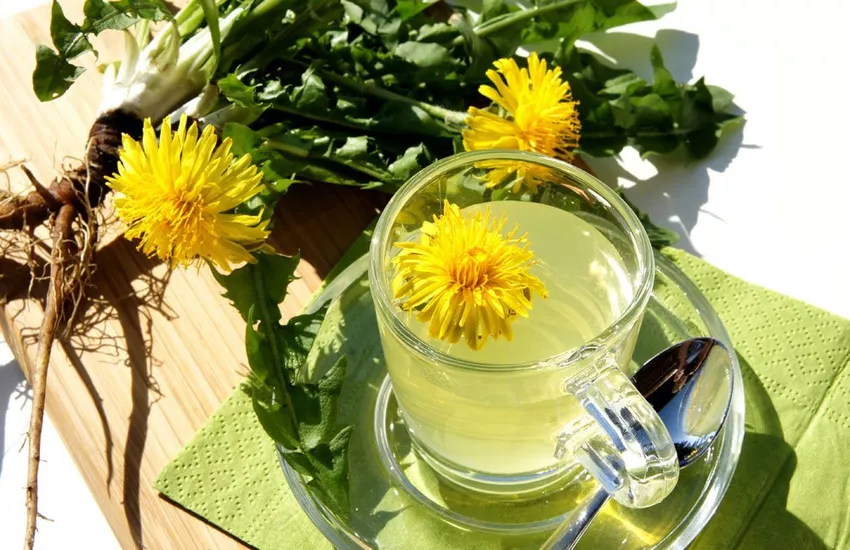In addition to the leaves, the dandelion root can also be used in many ways, for example as tea or vinegar. In addition, the dandelion root has a healing effect.
 Blossoms and leaves of the dandelion are increasingly being collected and processed into salads, tea or honey. One part of the plant that has been somewhat forgotten is the dandelion root. The dandelion root is also extremely he althy for the body. The bitter substances, which can relieve digestive problems, deserve special attention.
Blossoms and leaves of the dandelion are increasingly being collected and processed into salads, tea or honey. One part of the plant that has been somewhat forgotten is the dandelion root. The dandelion root is also extremely he althy for the body. The bitter substances, which can relieve digestive problems, deserve special attention.
Anyone who hasn't discovered dandelions yet has missed something. The plant, which is often dismissed as a weed, can be processed almost completely in the kitchen and in the production of medicinal products. The young dandelion leaves are prepared in a similar way to spinach, but can also be served as a salad with a dressing of your choice. Dandelion tea is a proven home remedy for various ailments. Even the flowers can be eaten or processed into honey. In the past, the dandelion was also considered a cheap coffee substitute, which nevertheless knew how to inspire with an intense aroma.
The dandelion root is just as versatile as the flower and leaves. The root can be used wonderfully in the kitchen. Of course, the taste is particularly relevant here. The dandelion root can be recognized primarily by its sweet but also bitter taste. This makes it very popular in salads and as a side dish.
What's in the dandelion root?
The use and consumption of the dandelion root is particularly recommended because of the valuable ingredients. The bitter substances are paramount here. There are not many natural products in which the bitter substances are naturally present, so the plant plays a special role. These bitter substances are made up of, among other things,
- Germacronoids
- Euresmolide
- Taraxacin
Thanks to these three substances, the dandelion root has a very positive effect on digestion and can, among other things, contribute to the production of significantly more digestive juices. Furthermore, the dandelion root contains aSubstance similar to furosemide.
Effects of Dandelion Root
 Thanks to the ingredients, the dandelion root has a variety of positive effects on the body. For example, the bitter substances ensure that there is a significantly stronger flow of bile. For the increased flow of bile, the liver has to work harder than before, which is why it also benefits from eating dandelion root. In addition, the dandelion root has a positive effect on the digestive juices and saliva.
Thanks to the ingredients, the dandelion root has a variety of positive effects on the body. For example, the bitter substances ensure that there is a significantly stronger flow of bile. For the increased flow of bile, the liver has to work harder than before, which is why it also benefits from eating dandelion root. In addition, the dandelion root has a positive effect on the digestive juices and saliva.
The development of flatulence and heartburn can be skilfully counteracted by the root. Another use is for urinary tract infections. Here the dandelion root convinces due to its draining effect and creates a quick relief in the area of the urinary tract. Anyone who suffers from dry skin can use the dandelion root to help the largest human organ regain its elasticity. a pressed juice can be prepared for this, which is then applied to the skin. Regular use of press juice pays off. On the one hand it has a positive effect on the complexion, on the other hand it ensures he althier hair and makes it appear stronger.
➔ Dandelion root for loss of appetite
The dandelion root is also a proven remedy for loss of appetite. Various causes, such as constant stress, personal problems, or gastrointestinal diseases, can contribute to a loss of appetite. If organic complaints could be ruled out, the consumption of dandelion root can counteract the loss of appetite. The feeling of hunger that arises after the dandelion root is due to the bitter substances. The bitter substances stimulate the digestive juices on the one hand and the saliva on the other. Both eventually signal to the body that it is hungry and in turn creates an appetite.
The high flow of saliva results in another advantage: The saliva can break down the food very quickly, so that the ingredients quickly enter the bloodstream and are transported further.
➔ Dandelion root promotes fat burning
Fatty meals and legumes ensure that the production of bile is contained. This is noticeable through various complaints:
- nausea
- Blowing
- Feeling of pressure in upper abdomen
- fat stool
- Fatigue
Important: Dandelion root should not be used for gallstones.
➔ Dandelion root to treat urinary tract infections
Those affected by urinary tract diseases are often advised to use dandelion root. In addition to the dandelion root, the dandelion herb can also be an important aid in flushing out the urinary tract. In addition to flushing, dandelion root also has a draining effect. The root can be used preventively, i.e. to protect the urinary tract from infections. In this case, however, sufficient fluid intake is also required. This should be at least two liters per day.
How is dandelion root used?
So that the dandelion root can develop its full effect, it must of course also be used correctly. As with all other components of the plant, there are various ways in which dandelion root can be used. The dandelion root is best processed into a tea.
➔ Tea made from dandelion root

- Wash and chop the dandelion root.
- Pour 250 ml of boiling water over the cut root.
- Let the dandelion root tea steep for about ten minutes - then enjoy.
As with any natural remedy, dandelion root should be used regularly for optimal effect. It is therefore advisable to take three to four cups a day. In order for the ingredients to have the best effect, they should be consumed about half an hour before eating.
All those who do not enjoy tea can make vinegar from the dandelion root and thus also benefit from the valuable ingredients. However, the production here is a little more complex than is the case with the tea:
➔ Make dandelion root vinegar yourself
You can use fresh or dried dandelion root for the vinegar.
- The cut root is placed in a mason jar. Care should be taken to ensure that the glass is well filled.
- The roots are then doused with apple cider vinegar and the jar is sealed.
- During the resting period of two weeks, the jar must be shaken at least once a day so that the nutrients of the root combine optimally with the vinegar.
- WithAfter two weeks, the vinegar is filtered in a sieve so that the dandelion root can be removed without any problems.
- The vinegar can be kept for a year if stored in a cool place.
Who shouldn't use dandelion root?
Although dandelion root is very he althy and contains many nutrients important for the body, it is not safe for everyone to use. Especially those who are allergic to the so-called cornflowers should refrain from doing so. People who are struggling with an intestinal obstruction or a bile duct obstruction also have to do without the natural remedy. The same applies to the accumulations of pus in the gallbladder. Incidentally, allergic reactions can occur not only when eating, but also when they come into contact with the skin.